
Angraecopsis is a genus of plants in the family Orchidaceae. It was first described by Fritz Kraenzlin in 1900 and given its name on account with the genus' similarity to Angraecum species. Angraecopsis are native to Africa, Madagascar, Réunion, Mauritius and the Comoros. The growth habit is rather small and the leaves emerge from a woody stem.

Aerangis gracillima is a species of plant in the family Orchidaceae. It is found in Cameroon and Gabon. Its natural habitat is subtropical or tropical dry forests.
Bulbophyllum deshmukhii, synonym Genyorchis macrantha, is a species of plant in the family Orchidaceae. It is endemic to Cameroon. Its natural habitat is subtropical or tropical dry forests.
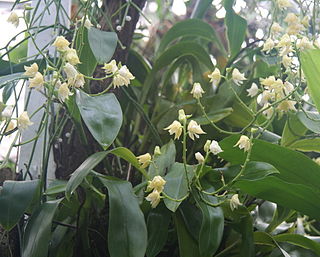
Polystachya, abbreviated Pol in horticultural trade, and commonly known as yellowspike orchid, is a flowering plant genus in the orchid family (Orchidaceae). This rather distinctive genus was described by William Jackson Hooker in 1824 and is the type genus of the subtribe Polystachyinae. It contains about 100 species widespread across many of the tropical areas of the world.

Jumellea is an orchid genus with 55 species native to Madagascar, the Comoros, the Mascarenes, and eastern Africa. In horticulture, it is often abbreviated Jum.
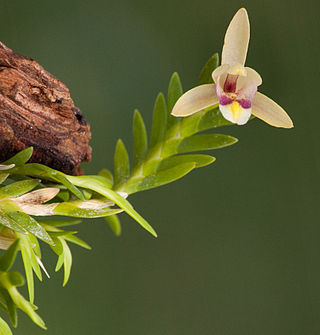
The Vandeae is a large monophyletic tribe within the family of orchids.

Angraecum distichum is a species of comet orchid that is found across sub-Saharan and tropical Africa.
Bulbophyllum mediocre is a species of orchid in the genus Bulbophyllum.

Calyptrochilum is a genus of flowering plants from the orchid family Orchidaceae native to tropical Africa, with one species extending into Brazil.
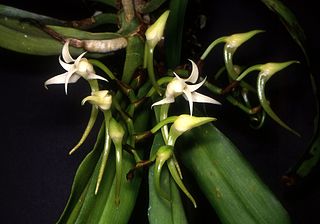
Cyrtorchis is a genus of flowering plants from the orchid family Orchidaceae native to Africa.

Diaphananthe is a genus of flowering plants from the orchid family, Orchidaceae. As currently conceived, it contains 33 accepted species, all endemic to sub-Saharan Africa.
Dinklageella is a genus of flowering plants from the orchid family, Orchidaceae. It contains 4 known species, all native to tropical West Africa.
- Dinklageella libericaMansf.
- Dinklageella minorSummerh.
- Dinklageella scandensStévart & P.J.Cribb
- Dinklageella villiersiiSzlach. & Olszewski
Tridactyle is a genus of flowering plants from the orchid family, Orchidaceae. It has about 60-70 known species, all native to sub-Saharan Africa.

Solenangis is a genus of flowering plants from the orchid family, Orchidaceae. It is native to sub-Saharan Africa.
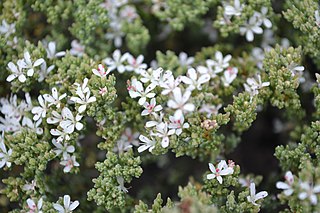
Frankenia is the only genus in the Frankeniaceae family of flowering plants. Other genera have been recognized within the family, such as Anthobryum, Hypericopsis and Niederleinia, but molecular phylogenetic studies have consistently shown that they all belong inside Frankenia. Frankenia comprises about 70–80 species of shrubs, subshrubs and herbaceous plants, adapted to saline and dry environments throughout temperate and subtropical regions. A few species are in cultivation as ornamental plants.
Afropectinariella doratophylla is a species of orchid in the genus Afropectinariella that is endemic to São Tomé and Príncipe. On São Tomé, it can be found from elevations of 850–1,600 m (2,790–5,250 ft), growing with Syzygium guineense or with Bulbophyllum lizae. On Príncipe, it is found in shrubby vegetation at around 300 m (980 ft) elevation. It is threatened by deforestation for agriculture and timber.
Afropectinariella gabonensis is a species of Afropectinariella that can be found in Cameroon, the Democratic Republic of the Congo, Equatorial Guinea and Gabon.

Afropectinariella pungens is a species of Afropectinariella that can be found in Cameroon, the Democratic Republic of the Congo, Equatorial Guinea, Gabon and Nigeria. It is found in dense lowland forests, downstream from waterfalls, and on periodically flooded marshes with Oxystigma mannii, between elevations of 50–1,800 m (160–5,910 ft). It also occurs on Terminalia catappa. It is threatened by habitat loss from agriculture and logging.
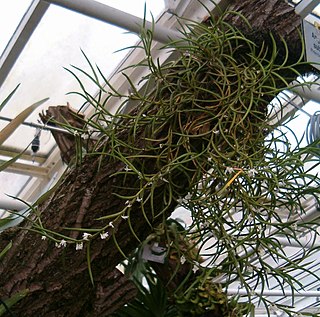
Afropectinariella subulata is a species of Afropectinariella that can be found in Cameroon, the Democratic Republic of the Congo, Côte d'Ivoire, Equatorial Guinea, Gabon, Ghana, Guinea, Liberia, Nigeria and Sierra Leone. This species is found in lowland forests, especially those rich in Caesalpinioideae between 50 and 700 m elevation. It occurs in periodically inundated swampy forests with Raphia, Pandanus and Marantaceae, and on calcareous rock in shrubby vegetation. It has been recorded on high shaded branches of Gilbertiodendron dewevrei.

Gilbertiodendron dewevrei is a species of tree in the family Fabaceae, native to tropical rain forests in Central Africa. It is often the dominant tree species of the Guineo-Congolian rainforest. The timber is traded as limbali, and is used for construction, flooring and railway sleepers. It is also used for making boats, furniture, tool handles and joinery and for making charcoal.














